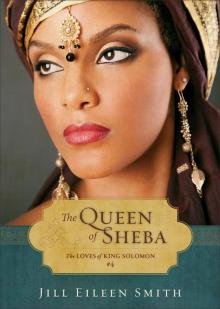- Home
- Jill Eileen Smith
Bathsheba Page 6
Bathsheba Read online
Page 6
She forced her mind back to examining the servants’ handiwork as she carried her cloak and scarf to the sitting room. The door to the courtyard stood ajar, letting the warm breeze filter through the house. Summer’s heat had grown oppressive in the past month, but shutting up the house was no better than letting the warmth seep inside. Bathsheba hated the closed-in feeling.
In the courtyard, a middle-aged female servant stood beating dust from a rug with a heavy wooden paddle. Tirzah lifted her head from where she stood polishing tables and lamps.
“Gather your cloak and come with me.” Bathsheba pulled her sandals from a basket by the door and sat on a low couch to tie them in place.
Tirzah tucked the linen dust cloth into her belt and hurried to her quarters. She returned as Bathsheba finished tying her other sandal.
“Leaving so soon, my lady?” Anittas’s frame blocked her path to the courtyard, his thick arms folded over his sturdy chest. Her constant protector, Uriah had urged Anittas to keep her safe.
“I promised my aunt I would stop by and spend some time with her before we head to Gibeon.”
“The master would have a servant accompany you.” He moved aside, but as she took a step forward, he followed her.
She stopped, turning to face him. “Tirzah is servant enough. I will be fine, Anittas.”
“Yes, mistress. Perhaps Shimron should go with you.”
“My cousin Rei will go with us to Gibeon. You have nothing to fear.” Uriah’s insistence that a male servant always accompany her had grown annoying. She covered her face well enough, and there was nothing about her dress to reveal what she looked like. In this Uriah was too much like her father, never giving her space to breathe, always hovering as though he feared someone would snatch her from beneath his watch or she would fly away like a bird. Ridiculous!
But Anittas would never agree with her assessment. She sighed, pulled the scarf over her head and across her face, and met the servant’s concerned gaze. “We will be well. Don’t worry so.” She patted his arm, trying to appear grateful for his fatherly concern, but was smothered by his guardedness. “My grandfather wouldn’t let anything happen to me, and he will also be joining us.”
Anittas nodded, apparently appeased. She stepped into the courtyard, Tirzah close behind. “If you send Shimron regardless, tell him to keep his distance.” She heard Anittas chuckle as she and Tirzah moved into the street.
“Why do you have the same conversation with him every time we go somewhere? You know he will send Shimron or another servant whether you want him to or not.” Tirzah tucked a basket she carried beneath one arm and came up beside Bathsheba.
“He shouldn’t worry so. And there is always the chance that one of these times he will listen to me and not feel like he has to watch my every step. He’s worse than a mother hen.” They passed the houses of their neighbors, where women sat grinding grain in their courtyards and young children played nearby. There was little place for them to run in the city except for the semi-crowded streets.
“He is doing his best to obey the master’s orders, mistress. You can hardly fault a servant for being about his master’s work.”
They rounded a corner to a busier street, the main thoroughfare that led to the king’s palace. Curiosity tugged her attention to the imposing palace gates, but she saw nothing but polished limestone and guards standing watch. She turned away, a sense of disquiet settling within her, disappointment making her uncomfortable. What did she expect—the king to be standing in the gate waiting for a glimpse of her as she passed by? Now who was being ridiculous?
She hurried along, her sandals slapping the paved stones, taking the path toward the street of merchants. A donkey-led cart clattered behind them, and they moved quickly to the side of the road to let it pass.
“Does something trouble you, mistress?” Tirzah’s soft voice in her ear made her look away. She swallowed and wrapped the scarf tighter across her face, glad for the covering to hide her expression from passersby.
“Nothing troubles me. I am only anxious to see my aunt.” She could never tell her servant her traitorous thoughts, despite the woman’s ability to keep her mouth from spilling over into gossip. Some things shouldn’t be shared, and her desire to see the king was chief among them. The very thought sounded worse than it was. She wasn’t looking for a replacement for Uriah. She only wanted someone to talk to, and he had been so captivating.
She gave herself a mental shake. No good would come of such thoughts.
Another cart rattled toward the merchants’ stalls the next street over. A baaing goat galloped after the cart and a young boy chased it, shouting. Bathsheba motioned for Tirzah to follow and kept walking.
They continued in silence until they reached a house much smaller than the one she shared with Uriah. She entered the familiar courtyard and ducked her head under the arch of the open door. The weather was warm enough that Bathsheba wished she could shed her cloak, but Uriah would want her to remain covered until she was inside the house.
“Aunt Talia. Are you home?”
Voices came from one of the rooms, and a moment later her aunt and cousin Rei hurried to her. Aunt Talia embraced her before she could speak another word. Unwanted tears came unbidden then. She hadn’t meant to show such emotion. She only wanted to talk to her aunt, to get some perspective on her life, to fill her loneliness.
“There, there.” Aunt Talia held her at arm’s length. “You come to greet me after these many months with tears? What troubles you, dear one?” She gently patted Bathsheba’s cheek.
Bathsheba shook her head, her face warming under her aunt’s touch. “I am fine, Aunt Talia, only missing you, missing everyone.” She glanced at Rei and the heat increased.
He gave her a thoughtful, curious look. “It’s good to see you, Cousin.” He smiled that boyish grin she had always loved, but his expression was not boyish at all. Rei had always loved her, had wanted to marry her, and if he’d been two years older instead of two years younger, her father might have considered a match. But it was too late to consider. She was a married woman, and Rei had a new bride of his own now.
“And you as well, Rei. How are you these days?” He had grown tall since she’d last seen him, his beard filled out, the muscles of a man beneath his tan tunic.
“I am well. I just stopped in to see if Mama needed anything from the market. I am on my way to buy some leather to cut into hinges for the doors. I have built two new rooms onto Mama’s house. Jarah is expecting.” His chin lifted in an obvious sense of pride.
Bathsheba’s heart constricted at the news. Rei had been married less than three months and already his wife was with child? Why did Adonai deny her a similar pleasure?
She smiled despite the ache in her soul. “Best wishes to you, Cousin. When can we expect this proud day?”
“Before the barley harvest.” He looked at her, then averted his gaze. “I must go if I want to make it back in time. We leave for the high place after the noon meal.”
“We will be ready,” Aunt Talia said, shooing Rei toward the door. “Now go.”
Aunt Talia cleared her throat as Jarah appeared in the room behind him, and motioned to Bathsheba. “Come into the house, dear child.”
“I will be back soon.” Rei dipped his head toward Bathsheba, kissed his wife’s cheek, then disappeared through the door.
“Come now, my dear.” Aunt Talia took Bathsheba’s arm and tugged her into the main room that doubled as a sitting and eating area. Low couches were set near a few low tables, with a lambskin draped over the stone floor. “Here, let me take your cloak.” Bathsheba undid the wrap and handed it to her aunt, who laid it over a hook in the wall. She turned to Tirzah to do the same, but Tirzah shook her head.
“I’ll just wait outside.”
Aunt Talia smiled her understanding as Tirzah slipped back into the courtyard. Aunt Talia looked at Jarah. “Daughter, could you get us some watered wine?” She glanced at Bathsheba. “Or tea perhaps?”
“Tea would be fine. But let me help you.” She studied her cousin’s wife. The girl was shorter than Chava, medium-boned and darker-skinned, sturdy like Tirzah. Her smile lit her mouth as she fluttered her arms in a dismissive gesture. “Nonsense. You and Mother must sit and catch up on things. I will join you shortly.”
“She’s a thoughtful girl.” Bathsheba faced Aunt Talia as Jarah left the room. Her aunt was a small, stout woman with graying hair pulled back beneath a brown head scarf. Her sturdy arms had seen many a good day’s work, and though widowed for several years now, she carried on, giving to those in need around her even out of her own meager means.
“She is good for Rei and a help to me in my old age.” Her look held no guile, and Bathsheba sensed the comment was meant to put her at ease. They both knew how much Rei had once cared for her.
“You’re hardly old, Aunt Talia. You have many good years ahead of you.”
Her aunt waved the thought away. “Only God knows how long a person has on this earth.” Her wistful expression told Bathsheba her aunt’s thoughts had turned to her husband Shem.
“Do you miss him still?”
Aunt Talia folded her arms across her wide girth. “At times, when I am alone in this room mending, I sense someone in the chair.” She pointed to the empty wooden chair across from them, the one Uncle Shem had often claimed as his. “I always look, expecting to see him, but of course he is never there.” Her chest lifted in a deep sigh. “I know he rests in Sheol, but sometimes his presence, the sense of him, is hard to forget.” She glanced up as Jarah returned with a tray of seasoned flat bread and three steaming clay cups of honeyed tea. “It is good to have Rei and Jarah here to ease my loneliness.”
Aunt Talia motioned for Jarah to take the seat beside her and twisted her bulk to face Bathsheba. “Now before Rei returns, tell me, what brought the emotion to your eyes? Of course, you are missing Uriah, but what else?”
Bathsheba took the cup her aunt handed to her and sipped slowly. “There is nothing else. I keep myself busy with the household duties, but the months drag on and there is no news of when the war will end. Sabba tells me that things are growing worse. The king will likely join the troops after the New Moon feast.”
“Good! The king should have joined his men from the start. Perhaps the war would have ended by now if David had led them rather than leaving Joab in charge. That man may have the loyalty of the army, but the king’s leadership is what they need. Besides, what good has it done for him to stay home and grieve? All he managed to do was add more wives to his household.” Aunt Talia picked up a basket of mending and threaded a needle, her hands keeping time with her words.
“Sabba didn’t tell me that.” The king had finally broken his vow to Abigail? Such a thing made sense now that Abigail was gone. “Perhaps the king was lonely.” She could understand the feeling, though the understanding did nothing to ease the guilt she felt over her interest in him.
Bathsheba took the basket from Jarah after the woman had chosen a tunic to mend, and picked up a shawl with the fringe missing in one corner. Keeping her hands busy provided a good distraction for her troubling thoughts.
“I’m sure he was lonely. No one wants to lose a spouse, child, but the king had plenty of other wives to choose from. He didn’t need to add more.”
“How many did he add?” Jarah’s smooth voice had a slight accent Bathsheba couldn’t place. Hadn’t Rei mentioned meeting her outside of Jerusalem? Or perhaps she had recently moved here.
“Some say three, some say five. Ach! One would be too many! The man should have gone to war.” Aunt Talia stabbed the bone needle into the soft wool fabric.
“Why should we care who the king marries?” Bathsheba’s hands stilled, the question begging an answer. Why did everyone in the kingdom concern themselves with the king’s private life? “Is he not entitled to happiness? Besides, Sabba says men from every tribe and even other nations are always willing to offer a daughter in marriage to the king. How can he refuse?”
“He refused just fine while Abigail lived. It is none of my business, to be sure, but it seems as though Adonai took the wrong wife.” A sigh lifted her aunt’s chest. “But who am I to question the Almighty? He gives and He takes away. Blessed be His name.”
“Blessed be His name,” Jarah and Bathsheba responded in unison.
They sat in silence stitching, while questions and uncertainty swirled in Bathsheba’s head. No wonder she had not seen the king about his roof in the months since Uriah left for war. He had married more women and was undoubtedly busy getting to know them. And if the reports of the war were true and Sabba had heard correctly, the king would leave to join his troops, and perhaps then Uriah could come home. And once Uriah was home she would no longer be lonely, and her thoughts would no longer drift to a forbidden friendship she had mostly imagined.
She glanced at Jarah, whose belly was already slightly swollen with Rei’s child. Seeds of envy sprouted, but just as quickly she doused them. Jarah might carry Rei’s child, but did she have his love? At least she knew Uriah loved her.
But as they walked to the high place later that afternoon, it was the king’s smiling face she longed to see, and she wondered if she was in love with her husband or with a figment of her imagination.
8
David stood at the curtained entrance of the tabernacle at the high place in Gibeon, surrounded by his counselors and bodyguards. The late afternoon breeze blew hot against his face, a trickle of sweat drawing a thin film along his crowned brow. The weight of the gold and jewels seemed heavier than usual as he entered the courtyard where the burnt offerings to the Lord burned continually day and night on the altar’s hearth.
A bull, six lambs, and a ram rimmed the perimeter, awaiting their fate as sin offerings on the bronze altar at the center. Gibeon afforded a better place for sacrifices than Jerusalem’s narrow streets. David had left Zadok, the high priest, in charge here from the moment he had brought the ark to Jerusalem. The plan had worked well, though he could never visit this place without wishing the sacrifices and worship before Adonai’s ark could be united in one magnificent temple.
The blast of a ram’s horn drew his attention to the priests dressed in fine linen ephods, with Zadok wearing the rich robes of Aaron’s high priesthood. Zadok and his son tugged the first ram to the center. David stepped forward and placed his hands on its head, symbolically transferring his sins to the animal to act as his substitute, though he knew no animal’s blood would ever be enough to cover a man’s sins.
The priest slit the ram’s throat in one swift motion. Moans and prayers from the hundreds of men and women spread out behind him drowned out the sound of the remaining bleating sheep.
David’s heart constricted, and he knelt in the dust, bowing his face to the rocky, grass-tufted terrain. The rustling, shifting sound of the crowd met his ears. His people would have followed his example, copying his posture. As they should. But the prayers he heard whispered around him seemed distant, the words coming to his mind merely rote sayings he’d memorized long ago and repeated far too often of late. Where were the prayers that usually sprang from his own lips, the communion he’d enjoyed with Adonai since his youth? The priestly ritual, this monthly sacrifice commanded by the law of Moses, had never been a habitual task but one he embraced with delight.
What had happened to his joy?
He pushed to his feet and waited as Zadok pronounced the final blessing. The sacrifice alone did not make a man clean. He knew that. Only when the heart was engaged in confession and repentance, accepting the offering as payment for his sin, did Adonai look upon a man as clean in His eyes. David glanced at the blue expanse overhead, its wispy clouds doing little to block the heat from the relentless sun. He raised a hand to shade himself from the glare.
Am I clean before You, Lord?
The prayer went unanswered, and he turned away from the altar. He didn’t feel clean, but he could name no sin in his heart either. Had he been wrong to take five new concubines? He searched his heart as his guards paved a path to take him to the head of the crowd and return to the city. He felt nothing. No guilt. No assurance. Despite his efforts, his heart had chilled where the warmth of Abigail’s love once lived. And he seemed powerless to do anything to change it. God should not have taken her from him.
He pushed ahead, picking his way over rocky ground, at last looking up at the faithful men and women who had accompanied him. He spotted Ahithophel, a familiar face he had not seen in at least a month. Catching Benaiah’s ever-present attention, he motioned toward his counselor, and the crowd parted as he approached.
“Ahithophel, my friend, where have you been this past month? I have missed your wise counsel.” David smiled, reached for the older man, and kissed each cheek. Ahithophel quickly bowed as David released him.
“My lord, you do me great honor.” He stood as David extended his hand and helped him up. “I spent some time at my home in Giloh. I am pleased to report the grape harvest was better than expected.”
“And I am happy to hear it. Come, let us walk together to the house of our God.” The last stop after the sacrifices would be a visit to the tent that held the ark. “Then you may join me at my table this night. The New Moon feast is not the same without you, my friend.” Though Ahithophel had a way of getting on his nerves sometimes, with his men at war, David missed his company.
“Thank you, my lord. I would be pleased to walk with you.” He stepped in time with David’s pace. “I have promised my granddaughter to eat the New Moon feast at her home tonight.” He glanced behind him, motioning toward a woman in a striped red and blue veil, her dark eyes the only thing visible beneath its folds. Several other women accompanied her. “But I am sure she will not mind terribly if I miss it. Unless, of course, you would care to join us, my lord?”

 Star of Persia: Esther's Story
Star of Persia: Esther's Story The Shepherdess
The Shepherdess Abigail (The Wives of King David Book #2): A Novel
Abigail (The Wives of King David Book #2): A Novel The Queen of Sheba
The Queen of Sheba Michal
Michal Rebekah
Rebekah A Passionate Hope--Hannah's Story
A Passionate Hope--Hannah's Story Daughter of the Nile
Daughter of the Nile Rachel
Rachel Sarai
Sarai Redeeming Grace: Ruth's Story
Redeeming Grace: Ruth's Story The Desert Princess
The Desert Princess The Prophetess - Deborah's Story
The Prophetess - Deborah's Story